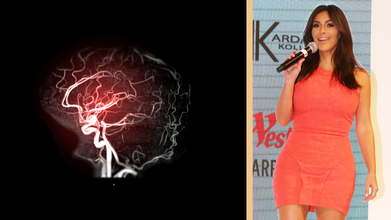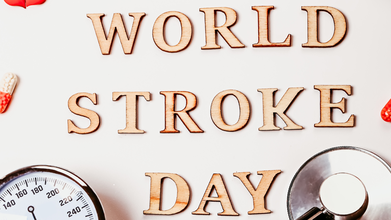- Health Conditions A-Z
- Health & Wellness
- Nutrition
- Fitness
- Health News
- Ayurveda
- Videos
- Medicine A-Z
- Parenting
- Web Stories
Kim Kardashian's Brain Aneurism Could Be Due To The Stress From Her Divorce With Kanye, More Details Inside

Credits: Canva and Wikimedia Commons
Enough keeping with Kardashians, if you felt that, you are wrong. In the latest season of The Kardashians, Kim Kardashian revealed that doctors discovered a "little aneurysm" in her brain during a scan. In a small clip, she is seen in a medical setting with her head bandaged. She says, "They're like, 'Just stress'."
Kim, now 45, explained that the small aneurysm, which is a balloon-like bulge in a blood vessel of the brain could be linked with the stress she has gone through over the past years. She said that her divorce with Kanye West, and her responsibilities that increased as a single mother of four, along with her multiple business ventures, and studying law along side, have all led to immense stress.
Neurosurgeon Dr Brian Hoeflinger, who posted a video on his Instagram channel reacting on Kim's brain aneurysm revelation says that while the annual rupture rate o the balloon-like swelling is less than 1%, the outcomes of a rupture could be fatal or leave lasting neurological damage.
What Is Brain Aneurysm?
Dr Hoeflinger explains, "a brain aneurysm is actually a weakness of a blood vessel in the brain." He says, "think of it like a garden hose. That garden hose can get a weak spot in it. You can get a ballooning off the side of a blood vessel and that ballooning is called aneurysm".
He says that it is not uncommon, as 1 in 50 people in the US have an unruptured brain aneurysm. This means around 6 million people in the country have in. He also notes that this is more common in women than in men.
He explains, while the rupturing rate is low, but when it does, it may be devastating and up to 50% of people die when they rupture a brain aneurysm. Of those who survive, two-thirds of them have neurological deficit.
What Causes A Brain Aneurysm?
He says while the cause is unknown, however, there could be genetic components to it.
He also notes environmental conditions as well as medical conditions like high blood pressure, atherosclerosis, and drug abuse could also increase risk of developing aneurysm.
Can Stress Cause Brain Aneurysm?
Doctor says that Kim thinks it is due to the stress in her life. He says, "If the stress elevates her blood pressure, that could be a predisposing factor to the aneurysm."
Dr Ninad Patil, who is a neurosurgeon in Pune, and specializes in brain and spine surgery writes in his blog that stress itself does not directly cause an aneurysm. However, Dr Patil notes, it can increase blood pressure, which is a major risk factor.
Common Symptoms Of Brain Aneurysm Before Rupture:
- Headaches, especially if it is one-sided
- Pain above or behind the eye
- Dilated pupil or vision changes
- Numbness or weakness in one side of the face
Common Symptoms of Brain Aneurysm After The Rupture:
- Sudden, severe headache
- Nausea or vomiting
- Stiff neck
- Blurred or double vision
- Seizures
- Loss of consciousness
He also notes that if someone is anxious and the severe panic attacks or anxiety attacks cause sudden spikes in blood pressure, then it could trigger a rupture if an aneurysm already exists. However, most people do not experience the symptoms until it ruptures, thus the best way is to go for regular checkups.
The 'BEFAST' Trick Could Help You Detect Your Stroke Before It Happens, According To Doctor

Credits: Canva
October 29 is observed as the World Stroke Day, annually. This day is recognized throughout the world and is observed to increase awareness of one of the leading causes of death and disability.
A stroke could happen to anyone, at any place, yet many people are not aware of the risk factors. This is why this day is observed worldwide, to bring attention on the warning signs and stroke prevention.
What Is The BEFAST Trick To Notice Stroke Signs?
Talking about warning signs, Dr Deep Das, a Neurologist at CMRI Kolkata says that the BEFAST trick could work best to notice for any early stroke system.
BEFAST stands for:
- B - Balance
- E - Eye or vision
- F - Face; Dr Das suggests to notice if the face becomes distorted
- A - Arm; the doctor suggests to check for weakness or loss of grip
- S - Speech; the suggestion is to look for slurred or unclear speech
- T - Time; the key is to act immediately without wasting anytime
"What makes a real difference is how quickly a stroke is diagnosed," notes Dr Das. The doctor also points out that with the advent of AI, the diagnosis could be done way faster. "Traditionally, stroke diagnosis and treatment have relied heavily on clinical expertise and imaging techniques, which could sometimes lead to delays in decision-making. AI has significantly enhanced these processes by providing rapid image analysis and predicting stroke outcomes with high accuracy."
World Stroke Day 2025: Theme
This year, the theme is 'Every Minute Counts'. The theme emphasizes on recognizing the symptoms and act fast on it, exactly what Dr Das also pointed out. On this, Dr Anjani Kumar Sharma, Director of Neuroscience at CK Birla Hospitals in Jaipur says, "World Stroke Day serves as a powerful reminder that stroke is a medical emergency that can affect anyone, anywhere, but it is also largely preventable." This is why every minute spent is crucial.
Dr Sharma says, "The acronym FAST, Face drooping, Arm weakness, Speech difficulty, Time to call emergency services — should be known to everyone." The doctor further adds that nearly 80% of strokes can be prevented through simple but consistent measures: controlling blood pressure and diabetes, avoiding tobacco and alcohol, eating a balanced diet, exercising regularly, and managing cholesterol. "Stroke is not the end," notes the doctor, "with timely medical intervention and focused rehabilitation, patients can regain independence and quality of life".
World Stroke Day Origin And Importance
The idea to celebrate a stroke day was initiated back in 2006 by global health leaders who recognized the importance of launching global movements and advocate against strokes. This has led to it being an important health event that focuses on educating the public on stroke warning signs, promoting prevention by keeping a healthy diet, as well as supporting survivors.
"As neurologists, we witness every day how stroke can strike suddenly, disrupting not only the life of an individual but also their family and community. Yet, what is heartening is that stroke is preventable, treatable, and increasingly survivable when recognized early," notes Dr Pushkar Gupta, Direct of Neurology at CK Birla Hospitals, Jaipur. The doctor says that the message for World Stroke Day is clear - to spread awareness and save lives.
Doctor Issues Warning To Anyone Taking Omeprazole For Acid Reflux — Here’s Why It Could Be Risky

Credits: Canva
BBC Morning Live’s Dr Punam Krishan has cautioned people who regularly use proton pump inhibitors (PPIs) such as omeprazole to manage heartburn, acid reflux, and indigestion. In the UK, one in four adults experiences acid reflux, especially after large meals, and many turn to PPIs to relieve symptoms. However, Dr Punam explained that long-term use of these medications could pose certain health risks and urged patients to have their prescriptions reviewed regularly.
Dr Punam, a practising NHS GP and resident medical expert on BBC’s Morning Live, is also a well-known health broadcaster and author of children’s books.
Omeprazole Warning For Acid Reflux
Speaking to hosts Gethin Jones and Helen Skelton, she began by explaining how acid reflux develops. “Acid reflux happens when stomach acid travels back up the food pipe,” she said. “We all have acid in our stomach, it plays a key role in breaking down food. A small valve, or sphincter, at the top of the stomach acts like a trapdoor to keep that acid in place. But when this valve becomes weak or too relaxed, the acid can flow back up the oesophagus, leading to that burning, heavy sensation people often describe.”
She added that large meals, alcohol, and lying down soon after eating can all make reflux worse.
When asked how reflux is usually treated, Dr Punam explained: “If you only experience symptoms occasionally, over-the-counter medicines like antacids or alginates, such as Gaviscon can help by neutralising stomach acid. They’re effective for mild cases and can be used as needed.”
“For ongoing discomfort, we prescribe proton pump inhibitors, or PPIs, like omeprazole or lansoprazole. These medicines are highly effective and have changed the way we treat acid reflux by targeting acid production directly at the source.”
Why Long-Term Use of PPIs Can Be Risky
Dr Punam warned that while PPIs are safe when used correctly, they are not intended for indefinite use. “These medications shouldn’t be taken unnecessarily or for long periods without medical review,” she said. “Extended use can slightly raise the risk of low magnesium or vitamin B12 levels and increase the likelihood of gut infections, particularly Clostridioides difficile, known as C. diff.”
She explained that C. diff is a bacterium that naturally exists in the gut but can overgrow when the balance is disturbed, sometimes causing persistent diarrhoea. “That’s a warning sign,” she said. “If you develop diarrhoea or notice changes in your bowel habits, speak to your doctor immediately. It’s very important to keep up with regular GP reviews if you’re on PPIs long-term.”
How Often Should People on PPIs See a Doctor?
If you are using omeprazole without a prescription, you should not continue for more than two weeks. See a doctor if:
- Your symptoms don’t improve after 14 days.
- Your symptoms get worse.
- Your symptoms return within four months of finishing treatment.
- You notice red flag signs such as difficulty swallowing, vomiting blood, or black stools.
Who Should Avoid the Covid-19 Vaccine? NHS Reveals Full Risk List

Credits: Canva
While the NHS will be inviting many people to receive their Covid-19 vaccinations this year, a small group will need to skip it, even if they qualify for a free jab. Vaccines play an essential role in strengthening our body’s defences against viruses and are especially important during colder months.
This is because illnesses like Covid-19 continue to evolve, which can reduce the immune system’s ability to fight them over time. While the vaccine isn’t mandatory for everyone, it remains strongly advised for those more likely to develop serious illness from a coronavirus infection. Below is the full NHS list of people who are advised not to take the Covid jab.
The NHS generally recommends the Covid-19 vaccine for adults aged 75 and older, those living in care homes for older adults, and individuals with weakened immune systems due to medical conditions or treatments. However, for some, the vaccine may pose risks of adverse reactions, making it unsafe to receive.
Side Effects Of Covid-19 Vaccine
Not everyone who gets a Covid-19 vaccine will notice side effects, but NHS guidance outlines a few common ones, including:
- Aching muscles
- Headache
- Fatigue
- Soreness at the injection site
- Mild flu-like symptoms
These reactions are typically mild and tend to disappear within a week. The NHS recommends taking paracetamol to ease any discomfort during recovery.
Full List Of People Who Can’t Have The Covid Vaccine
The NHS continues to encourage everyone eligible for the vaccine to take it, especially during the winter months when infection rates usually climb. However, a few groups may need to delay or avoid the jab altogether, such as:
- People currently unwell with Covid-19
- Anyone running a high temperature
- Individuals who are feeling generally unwell
- Those at risk of a severe allergic reaction
- People who have recently recovered from Covid-19
If you have previously experienced a severe allergic reaction to the Covid vaccine or any other jab, your GP or vaccination provider may refer you to an allergy specialist who can assess your situation. In some cases, you may be advised to receive the vaccine in a specialist setting, such as a hospital, where any reaction can be managed quickly.
According to NHS guidance, this level of caution is usually only required for those with a history of anaphylaxis. However, even if you’ve experienced mild allergic symptoms before, such as hives, wheezing, or a rashyou may still be able to get vaccinated safely.
If you believe you currently have a Covid-19 infection, it’s best to wait until you’ve fully recovered before booking your jab. The NHS also clarifies that those who’ve recently had Covid-19 may not need the vaccine right away, as their immune system is already primed to recognise and respond to the latest strain.
You can find full details and updates on NHS guidance about the Covid-19 vaccine on their official website.
© 2024 Bennett, Coleman & Company Limited

